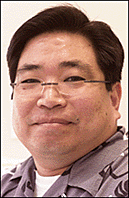

![]()
Gathering Places


![]()
Gathering Places
IT WAS ONE of those moments when I was rendered speechless. Almost 15 years ago, I was a graduate student in Washington, D.C. and on my lunch break. I had been reading in the Washington Post about the influx of Japanese into Atlanta to work in financial institutions. The article was accompanied by a photo of a Japanese woman with her small child. Unbeknownst to me, a young coed was reading over my shoulder. For invisible Asians,
the road to self-discovery
is a tricky path"I'm sorry but Orientals have such stupid smiles," she said loud enough for the whole office to hear. "They look so foolish sometimes."
I froze, then slowly turned and widened my almond eyes and said nothing. A look of recognition swept across her white face and she grinned. "Oh, Dave," she said as she reached out to tap me on the shoulder, "I don't consider you Oriental at all!" She then trotted off as if she had paid me the biggest compliment that she could bestow.
I was stunned. I was at once outraged, and, strange as it may seem, a little complimented. As the moment subsided, I felt a tinge of guilt. I had become an honorary white person. What had I done? Should I have been more Asian? What is Asian-ness anyway?
I was reminded of this incident after reading about Justin Geoffrey Fong, a sophomore at Harvard who set off a firestorm of protest after he penned a vitriolic essay entitled "Invasian" in the school's newspaper, The Crimson. (Columnist Michelle Malkin, whose parents are from the Philippines, addressed this same issue in Monday's Star-Bulletin.)
FONG IS A SIXTH-GENERATION Chinese American and his diatribe was meant to be part satire and part examination on how Harvard's allegedly insulated Asian-American students stubbornly practice self-segregation. But the piece, which began "It's not as if I dislike all Asians" and ends with: "Can't we all just get along?" was neither good satire nor analysis.
Rather, it was a self-loathing, hate-filled rant. "My eyes are poopy brown and my last name happens to sound like an onomatopoeia -- I abhor being classified as an Asian," Fong wrote.
It is amazing that the Crimson's staff would read something that was intellectual masturbation and mistake it for thoughtful discourse. The staff compounded the uproar by printing two apologies, which set off a fiery debate about free speech and political correctness. Was Harvard silencing a voice for change or apologizing for the nonsense of a loud-mouth dork?
The Wall Street Journal chimed in to complain that The Crimson's apologies were signs that college journalism was breeding wimpy editors.
What seems lost in the war of words was how Fong could feel such hostility toward Asians. But I know how it it could happen. It almost happened to me.
Like Fong, I moved easily throughout a multi-cultural university in a city deeply divided by race. I think both whites and blacks considered me a confidant. For my white friends I was just like them, only a little different. With my African-American friends it was as if we shared a secret understanding, an unspoken communication between people who have been discriminated against. At the same time, I was both The Man and a brother.
I CHERISH THE FRIENDSHIPS with these people, but I think that those bonds were formed on false pretenses. There was a whole side of me, my Asian side, that was hidden from them. No one saw my Asian-ness because, frankly, I didn't have anyone to be Asian with. I was an invisible Asian.
Invisibility can masquerade as invincibility. It gives you the illusion that you are color blind when actually you are colorless. Visibility is far trickier. It is more threatening to be part of a larger group. Groups mean power and power is dangerous. Would my friends -- both black and white -- think the same of me if I congregated regularly with fellow Asians over bowls of noodles?
If Fong has made himself invisible, as I did, he is blending together to the point of fading away. By being invisible, he is diminishing his friends and himself. Invisibility is comfortable and comforting to those around him, and Harvard's Asian horde must have threatened Fong's peaceful, multi-ethnic paradise.
Today, I still don't know what it means to be Asian. I do know that I still get a curious sense of pride when someone from my race does well, and a strange feeling of shame when they fail horribly. And I eat rice like there is no tomorrow. Is that being Asian or just parochial? I don't know. But every morning when I look in the mirror I see almond eyes and what might be a stupid smile on the face of someone who is no longer invisible.
David K. Choo is managing editor of Hawaii Business magazine.